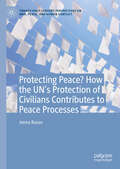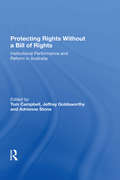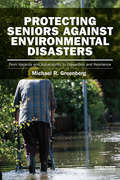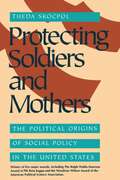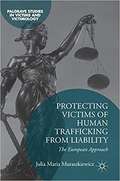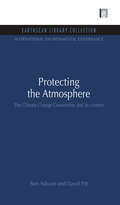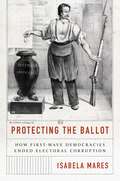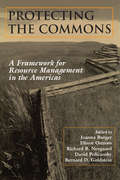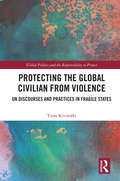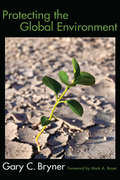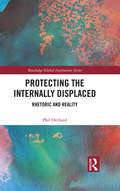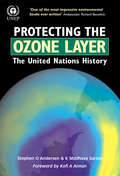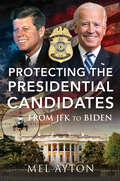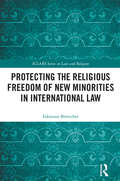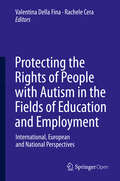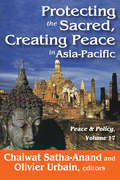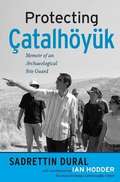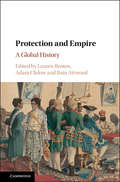- Table View
- List View
Protecting Nuclear Weapons Material In Russia
by National Research Council Staff Office of International Affairs StaffThe management challenge in orchestrating a multitude of DOE headquarters, laboratory, and contractor personnel at about 50 sites in Russia is daunting. Steps are needed to maximize the return on U.S. expenditures, to reduce redundancy while ensuring adequate oversight, and to provide additional work incentives that will attract highly qualified specialists from the United States and Russia to participate in the protection, control, and accountability of direct-use material (MPC&A) program. This report contains many recommendations to address these and related issues.
Protecting Our Ports: Domestic and International Politics of Containerized Freight Security (Homeland Security)
by Suzette R. Grillot Rebecca J. CruiseSince the terrorist attacks of September 11, 2001, there has been much discussion of the security of borders and ports of entry in the United States and around the world. Ports of entry, particularly sea ports, are viewed as one of the most defenceless targets for a terrorist attack. In response to this perceived vulnerability, a number of port security initiatives have been implemented both on both a domestic and international level. This timely project investigates a number of issues surrounding the container security issue. It examines the scope of containerized freight security, analyzes cooperation between agents in the United States and abroad, explores the politics of port security, and provides an assessment of 17 of the world's sea ports. The work sheds light on the container security threat and the domestic and international responses that have emerged, as well as those steps that still must be taken.
Protecting Peace? How the UN’s Protection of Civilians Contributes to Peace Processes (Twenty-first Century Perspectives on War, Peace, and Human Conflict)
by Jenna RussoOver the last twenty years, the protection of civilians (POC) has become central to the mandates of multidimensional peacekeeping operations, elevated as a core issue on the Security Council’s agenda, and designated as a priority among mandated tasks. This prioritization is based in part on assumptions that POC is a critical enabling factor to achieve peace and that it contributes to the durability of peace. However, the truth of these assumptions remains untested. In this illuminating study, Jenna Russo explores the relationship between violence against civilians and peace, including whether such violence lengthens conflict duration or undermines the prospects for longer-term peacebuilding. Using a mixed-methods approach, including case studies on South Sudan and the Democratic Republic of the Congo, she then examines the extent to which UN POC activities are able to protect civilians from violence and mitigate the potential negative impact it has on peace. This book contributes to both academic and policy debates around the effectiveness of peacekeeping and the protection of civilians, as well as academic research related to conflict duration and the effects of violence.
Protecting People and Buildings from Terrorism: Technology Transfer for Blast-effects Mitigation
by Committee for Oversight Assessment of Blast-effects Related ResearchConcerned with the vulnerability of U. S. civilian and military personnel to terrorist bombing attacks, the U. S. Congress directed the Department of Defense to undertake a comprehensive research and testing program aimed at protecting people in buildings from such attacks. The Blast Mitigation for Structures Program (BMSP) was initiated in 1997 and has produced a large volume of experimental and analytical data that will permit the design of new, more robust buildings as well as the development of methods to retrofit a large number of vulnerable existing structures. This report reviews the BMSP program and investigates a process that would use existing institutional infrastructures (i. e. , building code and standards-writing organizations, professional and technical organizations, universities, and research centers) to disseminate knowledge.
Protecting Rights Without a Bill of Rights: Institutional Performance and Reform in Australia (Law, Justice And Power Ser.)
by Jeffrey GoldsworthyAustralia is now the only major Anglophone country that has not adopted a Bill of Rights. Since 1982 Canada, New Zealand and the UK have all adopted either constitutional or statutory bills of rights. Australia, however, continues to rely on common law, statutes dealing with specific issues such as racial and sexual discrimination, a generally tolerant society and a vibrant democracy. This book focuses on the protection of human rights in Australia and includes international perspectives for the purpose of comparison and it provides an examination of how well Australian institutions, governments, legislatures, courts and tribunals have performed in protecting human rights in the absence of a Bill of Rights.
Protecting Seniors Against Environmental Disasters: From Hazards and Vulnerability to Prevention and Resilience (Earthscan Risk in Society)
by Michael R GreenbergThe baby boom generation were born between 1946 and 1964 and are the largest population cohort in US history. They should number about 90 million by mid-century, more than doubling their current size. The massive increase in seniors and relative decline of those of working age in the US is mirrored in almost all the world’s most populous countries. This book connects the dots between the US baby boom generation and the marked increase in natural and human-caused disasters. It evaluates options available to seniors, their aids, for and not-for and for-profit organizations and government to reduce vulnerability to hazard events. These include coordinated planning, risk assessment, regulations and guidelines, education, and other risk management efforts. Using interviews with experts, cases studies, especially of Superstorm Sandy, and literature, it culls best practice and identify major gaps. It is original and successful in making the connection between the growing group of vulnerable US seniors, environmental events, and risk management practices in order to isolate the most effective lessons learned.
Protecting Soldiers And Mothers: The Political Origins Of Social Policy In The United States
by Theda SkocpolIt is a commonplace that the United States lagged behind the countries of Western Europe in developing modern social policies. But, as Theda Skocpol shows in this startlingly new historical analysis, the United States actually pioneered generous social spending for many of its elderly, disabled, and dependent citizens. During the late nineteenth century, competitive party politics in American democracy led to the rapid expansion of benefits for Union Civil War veterans and their families. Some Americans hoped to expand veterans' benefits into pensions for all of the needy elderly and social insurance for workingmen and their families. But such hopes went against the logic of political reform in the Progressive Era. Generous social spending faded along with the Civil War generation. Instead, the nation nearly became a unique maternalist welfare state as the federal government and more than forty states enacted social spending, labor regulations, and health education programs to assist American mothers and children. Remarkably, as Skocpol shows, many of these policies were enacted even before American women were granted the right to vote. Banned from electoral politics, they turned their energies to creating huge, nation-spanning federations of local women's clubs, which collaborated with reform-minded professional women to spur legislative action across the country. Blending original historical research with political analysis, Skocpol shows how governmental institutions, electoral rules, political parties, and earlier public policies combined to determine both the opportunities and the limits within which social policies were devised and changed by reformers and politically active social groups over the course of the late nineteenth and early twentieth centuries. By examining afresh the institutional, cultural, and organizational forces that have shaped U.S. social policies in the past, Protecting Soldiers and Mothers challenges us to think in new ways about what might be possible in the American future.
Protecting Victims of Human Trafficking From Liability: The European Approach (Palgrave Studies in Victims and Victimology)
by Julia Maria MuraszkiewiczThis books demonstrates the difficulty of protecting victims of human trafficking from being held liable for crimes they were compelled to commit in the course, or as a consequence, of being trafficked, under current European law. The legislation remains vague and potentially inadequate to recognise victimhood, safeguard the human rights of victims, and avoid further victimisation. Wiliamson explains how the non-liability principle is rooted in criminal and human rights law, and proposes a more efficient provision and framework which would protect trafficked persons, and do better to encourage victims to act as witnesses in criminal proceedings against the perpetrators. In doing so the book will provide relevant stakeholders, including policy makers and law enforcement authorities, with a better understanding of the non-liability principle and how it ought to be used in practice.
Protecting the Atmosphere: The Climate Change Convention and its context (International Environmental Governance Set)
by Sten Nilsson David Pitt'The authors take us into less-known corridors of climate Realpolitik and energy power play. We are provided with the essential vocabulary to understand what is at stake and how the challenge should be tackled' Prince Sadruddin Aga Khan Global warming and the resulting climate change present one of the greatest potential threats humanity has had to face. Every country contributes to them and they affect every person. Correspondingly, the Framework Convention on Climate Change, negotiated at the Earth Summit and since, is potentially one of the most significant international agreements ever reached � and its successful implementation is vital if the threat is to be averted. This book provides a guide to the Convention and explains in very clear terms what is involved: the background which makes it so necessary; the tortuous process involved in negotiating it; what it says; and most importantly, how it must be interpreted and implemented, making clear the scale of the changes involved and the dangers of evading them. Sten Nilsson is leader of the forest resources project at the International Institute for Applied Systems Analysis. David Pitt is a consultant to the Bellerive Foundation and Alp Action. They are the authors of Mountain World in Danger, published by Earthscan in 1991. Originally published in 1994
Protecting the Ballot: How First-Wave Democracies Ended Electoral Corruption
by Isabela MaresHow reforms limiting electoral misconduct completed the process of democratizationBetween 1850 and 1918, many first-wave democracies in Europe adopted electoral reforms that reduced the incidence of electoral malfeasance. Drawing on analysis of parliamentary deliberations and roll-call votes in France, Germany, Belgium, and the United Kingdom, Protecting the Ballot explores how these electoral changes came about.Reforms limiting electoral malfeasance came in a variety of forms. Some reforms imposed harsher punishments for bribing or the politicization of state resources during campaigns. Other changes improved electoral secrecy, providing better protection of voters’ autonomy. By mandating the presence of candidate representatives supervising electoral operations, reforms also reduced the incidence of electoral fraud. Isabela Mares documents how elite splits facilitated the formation of parliamentary majorities in support of electoral reforms. The political composition of these majorities varied across countries and across issue area, depending on the distribution of political resources and the economic and electoral costs incurred by politicians with opportunities to engage in malfeasance. Unpacking the electoral determinants of the demand for reforms, Mares offers an alternative to theories of democratization that emphasize economic considerations alone.By studying the successful adoption of reforms limiting electoral irregularities in first-wave democratic transitions, Protecting the Ballot sheds light on the opportunities and obstacles for ending electoral wrongdoing in recent democracies.
Protecting the Commons: A Framework For Resource Management In The Americas
by Joanna Burger Elinor Ostrom Bernard D. Goldstein David Policansky Richard NorgaardCommons -- lands, waters, and resources that are not legally owned and controlled by a single private entity, such as ocean and coastal areas, the atmosphere, public lands, freshwater aquifers, and migratory species -- are an increasingly contentious issue in resource management and international affairs.Protecting the Commons provides an important analytical framework for understanding commons issues and for designing policies to deal with them. The product of a symposium convened by the Scientific Committee on Problems of the Environment (SCOPE) to mark the 30th anniversary of Garrett Hardin's seminal essay "The Tragedy of the Commons" the book brings together leading scholars and researchers on commons issues to offer both conceptual background and analysis of the evolving scientific understanding on commons resources. The book: gives a concise update on commons use and scholarship offers eleven case studies of commons, examined through the lens provided by leading commons theorist Elinor Ostrom provides a review of tools such as Geographic Information Systems that are useful for decision-making examines environmental justice issues relevant to commons .Contributors include Alpina Begossi, William Blomquist, Joanna Burger, Tim Clark, Clark Gibson, Michael Gelobter, Michael Gochfeld, Bonnie McCay, Pamela Matson, Richard Norgaard, Elinor Ostrom, David Policansky, Jeffrey Richey, Jose Sarukhan, and Edella Schlager.Protecting the Commons represents a landmark study of commons issues that offers analysis and background from economic, legal, social, political, geological, and biological perspectives. It will be essential reading for anyone concerned with commons and commons resources, including students and scholars of environmental policy and economics, public health, international affairs, and related fields.
Protecting the Frontline in Biodefense Research: The Special Immunizations Program
by National Research Council of the National AcademiesThe U.S. Army's Special Immunizations Program is an important component of an overall biosafety program for laboratory workers at risk of exposure to hazardous pathogens. The program provides immunizations to scientists, laboratory technicians and other support staff who work with certain hazardous pathogens and toxins. Although first established to serve military personnel, the program was expanded through a cost-sharing agreement in 2004 to include other government and civilian workers, reflecting the expansion in biodefense research in recent years. Protecting the Frontline in Biodefense Research examines issues related to the expansion of the Special Immunizations Program, considering the regulatory frameworks under which the vaccines are administered, how additional vaccines might be considered for inclusion in the Program, and factors that might influence the development and manufacturing of vaccines for the Special Immunizations Program.
Protecting the Global Civilian from Violence: UN Discourses and Practices in Fragile States (Global Politics and the Responsibility to Protect)
by Timo KivimäkiThis book reveals why the UN is more successful than unilateral great powers in protecting civilians from violence, and focuses on the discourse, development and consequences of UN peacekeeping. Analysing statistics of state fragility and fatalities of violence, it reveals that the UN has managed to save tens of thousands of lives with its peacekeeping: a surprising statistic given the media consensus about the UN’s powerlessness and inefficiency. Using computer-assisted discourse analysis of resolutions from the UN Security Council, 1993-2019, the book offers data that describe the character and development of UN approach to the protection of civilians from violence. It then links the data to the statistics of conflict fatalities and state fragility to reveal, by means of qualitative and quantitative analysis, when, where, how and why the UN has been successful at protecting civilians. Two reasons for the UN’s success are highlighted in the book as being statistically most significant. First, the organization offers local ownership to peaceful solutions by considering conflicting parties as the primary agents of protection. Second, the UN approach is much less power-oriented than unilateral approaches by the great powers: protection for the UN does not mean deterrence or destruction, but rather, support for local protectors of civilians. However, strong great power influence on such operations tends to weaken UN’s ability to save lives. This book will be of much interest to students of humanitarian intervention, peacekeeping, human rights and International Relations in general.
Protecting the Global Environment
by Gary C Bryner" Gary Bryner's brief, readable, capstone book: " Features a forward by Mark A. Boyer Outlines the major environmental challenges facing the world today Applies international relations theory to these challenges Covers such key topics as development, sustainability, and market capitalism Offers a social justice perspective to environmental problems and solutions Borne of an amalgam of social science, fieldwork, and a passionate commitment to justice, this book brings debates about climate change to a new level, compelling readers and researchers to rethink the reasons for reversing global environmental trends. The book lays out three inspirations for improving environmental prospects: effective markets, sustainable development, and environmental justice for the most vulnerable. It also projects three possible scenarios flowing from the success or failure of these inspirations one bleak, one breakthrough, and one of status quo. Gary Bryner is not sanguine about humanity s ability to make the right choices, but this does not deter him from asking us to think beyond our own generation and our own species in urging environmental action now."
Protecting the Individual from International Authority
by Michael Zürn Monika HeupelInternational organizations (IOs) develop institutional provisions to make sure that their policies do not violate human rights. Accordingly, whilst IOs have a greater scope of action and ability to promote collective goods than ever before, they also have a greater capacity to do harm. Based on ten case studies on UN and EU sanctions policy, UN and NATO peacekeeping, and World Bank and IMF lending, this book examines human rights violations which can arise from the actions of IOs rather than those of states. It further explains how powerful IOs have introduced human rights protection provisions and analyzes the features of these provisions, including differences in their design and quality. This book provides evidence of a novel legitimation strategy authoritative IOs draw on that has, as yet, never been systematically studied before.
Protecting the Internally Displaced: Rhetoric and Reality (Global Institutions)
by Phil OrchardToday, there are over 40 million conflict-induced internally displaced persons (IDPs) globally, almost double the number of refugees. Yet, IDPs are protected only by the soft-law Guiding Principles on Internal Displacement at the global level. Instead of a dedicated international organization, IDPs receive protection and assistance only through the UN’s cluster approach. Orchard argues that while an international IDP protection regime exists, many aspects of it are informal, with IDP issues bound up in a humanitarian regime complex that divides the mandates of key organizations and even the question of IDP status itself. While the Guiding Principles mark an important step forward, implementation of laws and policies based on them at the domestic level remains haphazard. Action at the international level similarly reflects an all-too-often ad hoc approach to IDP issues. Through an in-depth examination of IDP efforts at the international level and across the forty states which have adopted IDP laws and policies, Orchard argues that while progress has been made, new and greater monitoring and accountability mechanisms at both the domestic and international levels are critical. This work will be valuable to scholars, students, and practitioners of forced migration, international relations theory, and the Responsibility to Protect doctrine.
Protecting the Ozone Layer: The United Nations History
by Stephen O Andersen K Madhava SarmaIn the 1970s the world became aware of a huge danger: the destruction of the stratospheric ozone layer by CFCs escaping into the atmosphere, and the damage this could do to human health and the food chain. So great was the threat that by 1987 the UN had succeeded in coordinating an international treaty to phase out emissions; which, over the following 15 years has been implemented. It has been hailed as an outstanding success. It needed the participation of all the parties: governments, industry, scientists, campaigners, NGOs and the media, and is a model for future treaties. This volume provides the authoritative and comprehensive history of the whole process from the earliest warning signs to the present. It is an invaluable record for all those involved and a necessary reference for future negotiations to a wide range of scholars, students and professionals.
Protecting the Presidential Candidates: From JFK To Biden
by Mel AytonProtecting the Presidential Candidates is the first book of its kind to examine how presidents and presidential candidates were protected during the presidential election cycles – from JFK to Biden. It is also the first book of its kind to tell the story of the role of state troopers and private bodyguards in protecting presidential candidates. Protection for candidates changed and evolved from the free-wheeling style of the 1950s and early 1960s, which afforded presidential candidates little or no protection, to the growth of bodyguard personnel, increased intelligence facilities and state of the art technology employed today to keep the candidates safe. Presidential candidates relish connecting with the public and it has given greater visibility to the bodyguards who are willing to place themselves between a presidential candidate and a would-be attacker. In the milieu in which the Secret Service operates, bodyguards have witnessed the terrors of election campaigns when presidential candidates have waded into crowds to shake hands with their supporters, rode in open-top cars, and made sudden but risky changes to their schedules – oblivious to the fact that in every campaign there have been people stalking candidates with ill intent. Many stories revealed in Protecting the Presidential Candidates have remained largely hidden from the public; some buried in newspaper archives and others in oral histories, presidential libraries or official government documents. The author draws on numerous sources, including FBI files, presidential biographies, vice presidential biographies, civilian bodyguard memoirs, Secret Service agent memoirs, White House staff memoirs and more so that these stories can now be told. The book also allows readers to gain an insight into the personal as well as professional relationships between the candidate and the bodyguards who protected them. Some candidates were so trusting of their bodyguards they embraced them as part of an ‘inner circle’ of advisers. Bodyguards have also witnessed embarrassing moments in a candidate’s campaign and how intrusive they have been at the most delicate of moments. "The president’s day is your day," one agent said. "Nobody sees the president the way an agent does."
Protecting the Religious Freedom of New Minorities in International Law (ICLARS Series on Law and Religion)
by Fabienne BretscherThis book examines the interpretation and application of the right to freedom of religion and belief of new minorities formed by recent migration by the European Court of Human Rights (ECtHR) and the United Nations Human Rights Committee (HRC). New minorities are increasingly confronted with restrictions of their religious practices and have addressed their rights claims both to the ECtHR and the HRC through their individual complaint procedures, which resulted in several contradicting decisions. Based on a quantitative and qualitative empirical analysis of the relevant case law, focusing in particular on the reasoning adopted by the two bodies, this book finds that the HRC in its practice offers a significantly higher level of protection to new minorities than the ECtHR. Such divergence may be explained by various institutional and conceptual differences, of which the concept of the margin of appreciation is the most influential. It is contended that the extensive use of the concept of the margin of appreciation by the ECtHR in the case law regarding new minorities’ right to freedom of religion and belief, and the absence of such concept in the HRC’s case law, could be explained by different understandings of the role of an international human rights body in conflicts between the majority and minorities. This book argues that such divergence could be mitigated with various tools, such as the inclusion of cross-references to the case law of other relevant bodies as well as to instruments specifically established for the protection of minorities. The book will be of interest to academics, researchers and practitioners in the area of international human rights law, international public law in general and law and religion.
Protecting the Rights of People with Autism in the Fields of Education and Employment
by Valentina Della Fina Rachele CeraFundamental rights for all people with disabilities, education and employment are key for the inclusion of people with autism. They play as facilitators for the social inclusion of persons with autism and as multipliers for their enjoyment of other fundamental rights. After outlining the international and European dimensions of the legal protection of the rights to education and employment of people with autism, the book provides an in-depth analysis of domestic legislative, judicial and administrative practice of the EU Member States in these fields. Each chapter identifies the good practices on inclusive education and employment of people with autism consistent with principles and obligations enshrined in the UN Convention on the Rights of Persons with Disabilities (Articles 24 and 27). The book contains the scientific results of the European Project "Promoting equal rights of people with autism in the field of employment and education" aimed at supporting the implementation of the UN Convention in the fields of inclusive education and employment.
Protecting the Sacred, Creating Peace in Asia-Pacific (Peace And Policy Ser.)
by Chaiwat Satha-Anand Olivier UrbainUsing case studies from the Middle East, South Asia, Southeast Asia, and the Pacific Basin, this book examines the global trend of violence against religious places and figures. The contributors believe attacks on sacred places to be particularly damaging to peace and harmony because of the centrality of religion in many Asian and Pacific countries.A diverse range of topics are covered, including an empirical exploration of the global trends of violence against sacred spaces; attacks against and policies toward holy sites in Israel and the Palestinian Territories; the fate of Indian Islamic monuments after India gained independence in 1947; the Christian community's response to the increasing Islamization of Malaysia, and the future of communalism in Malaysia. Africa and Australia are also referenced in the work.Taken together, this volume explores the importance of protecting sacred spaces, holy symbols, and religious people as a crucial element in fostering peace in the world, and especially the Asia-Pacific region. The contributors argue that much of the violence in the world is rooted in politics of religious identity.
Protecting the Vulnerable: A Reanalysis of Our Social Responsibilities
by Robert E. GoodinIn this book, Robert E. Goodin speaks on our special responsibilities toward our families, friends, clients, compatriots, etc., that are relatively strong moral claims with restricted scope. He adds, vulnerability of the beneficiary rather than any voluntary commitment per se on the part of the benefactor which generates these special responsibilities and we should always strive to protect the vulnerable.
Protecting Çatalhöyük: Memoir of an Archaeological Site Guard
by Sadrettin Dural Ian HodderThey are essential to every major archaeological excavation but rarely acknowledged by the visiting researchers once the artifacts have been shipped. As part of the innovative, multivocal output from the famous Turkish Neolithic site of Çatalhöyük, we hear from one of the site guards, Sadrettin Dural, who tells the story of the excavation from the point of view of the 'Other'. He offers tales of the strange habits of archaeologists, describes the local in-fighting that scholars never see, and explains how scientists can be protected from the Yatirs, spirits of the dead who guard the mound. Ian Hodder, director of the Çatalhöyük project, provides explanatory notes for the reader and an interview with the author, exploring indigenous interpretations of ancient sites and the archaeologists who excavate them. For the archaeologist, this offers a revolutionary new viewpoint on their work. For the cultural anthropologist, Dural's role as site guard is only a small part of his life as a Turkish villager. The author recounts the daily lived experience of one man in a contemporary Turkish village, including changing economic strategies for supporting his family, brushes with the law, trips to the beach and the city, and Turkish phone sex.
Protection Amid Chaos: The Creation of Property Rights in Palestinian Refugee Camps (Columbia Studies in Middle East Politics)
by Nadya HajjThe right to own property is something we generally take for granted. For refugees living in camps, in some cases for as long as generations, the link between citizenship and property ownership becomes strained. How do refugees protect these assets and preserve communal ties? How do they maintain a sense of identity and belonging within chaotic settings?Protection Amid Chaos follows people as they develop binding claims on assets and resources in challenging political and economic spaces. Focusing on Palestinians living in refugee camps in Lebanon and Jordan, it shows how the first to arrive developed flexible though legitimate property rights claims based on legal knowledge retained from their homeland, subsequently adapted to the restrictions of refugee life. As camps increased in complexity, refugees merged their informal institutions with the formal rules of political outsiders, devising a broader, stronger system for protecting their assets and culture from predation and state incorporation. For this book, Nadya Hajj conducted interviews with two hundred refugees. She consults memoirs, legal documents, and findings in the United Nations Relief Works Agency archives. Her work reveals the strategies Palestinian refugees have used to navigate their precarious conditions while under continuous assault and situates their struggle within the larger context of communities living in transitional spaces.
Protection and Empire: A Global History
by Lauren Benton Adam Clulow Bain Attwood"For five centuries protection has provided a basic currency for organising relations between polities. Protection underpinned sprawling tributary systems, permeated networks of long-distance trade, reinforced claims of royal authority in distant colonies and structured treaties. Empires made routine use of protection as they extended their influence, projecting authority over old and new subjects, forcing weaker parties to pay them for safe conduct and, sometimes, paying for it themselves. The result was a fluid politics that absorbed both the powerful and the weak while giving rise to institutions and jurisdictional arrangements with broad geographic scope and influence. This volume brings together leading scholars to trace the long history of protection across empires in Asia, Africa, Australasia, Europe and the Americas. Employing a global lens, it offers an innovative way of understanding the formation and growth of empires and uncovers new dimensions of the relation of empires to regional and global order"--


